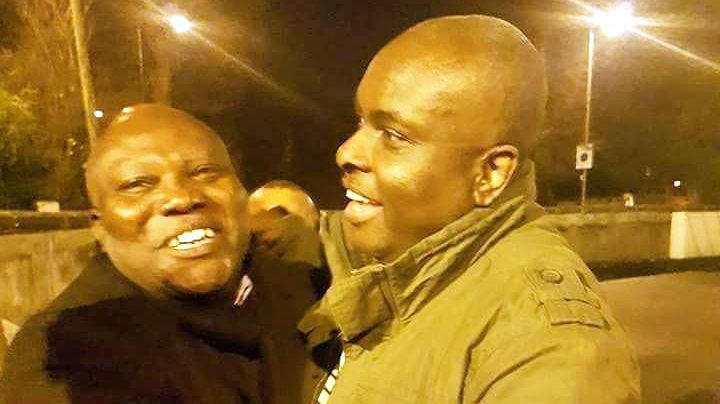
James Ibori reputedly wielded influence in his native Nigeria even from his British prison cell, where he was serving a 13-year sentence for money laundering and fraud.
With the 57-year-old now back on home soil, few doubt he will remain an important player in the cut-throat world of Nigerian politics — even behind the scenes — as elections approach in two years.
The former governor of Delta state in the oil-rich south, who used looted public funds to buy luxury homes, top-of-the-range cars and a private jet, has said that African politicians never retire.
“Politics is in his blood,” his former adviser Ighoyota Amori told AFP. “He will for now take a short rest before deciding on the next line of action.”
But in a strong hint Ibori was eyeing some political role, just as parties begin jostling for position for the 2019 vote, Amori said his former boss was a political “godfather and kingmaker”.
“No politician worth his calling can take Ibori’s endorsement for granted. He will forever remain relevant in national affairs,” he added.
– ‘Personal sacrifice’ –
Ibori, a former cashier at a British chain of DIY stores, was jailed in April 2012 for fraud amounting to nearly 50 million pounds (at the time $78.5 million, 62 million euros).
The trial judge and police, however, believe he misappropriated much more.
His conviction in Britain followed a drawn-out extradition procedure from Dubai, where he fled in 2010, and his evasion of arrest and prosecution in Nigeria.
The case was seen as a landmark in the fight against high-level international corruption, with billions of pounds of illicit cash said to be channelled through Britain every year.
Ibori was released in December after serving just over four years of his sentence and launched an appeal against his conviction, angering anti-corruption campaigners.
Being a convicted criminal would spell the end of a politician’s career in many places around the world.
But not in Nigeria, where power is widely seen as an end in itself, patronage is everything and claims of corruption and conflict of interest are rarely a bar to high office.
As such, Ibori’s status remains undiminished in the eyes of his Delta kinsmen, who Amori said kept in constant touch with him during his incarceration.
“His prison ordeal was a personal sacrifice he had to make as a leader,” he added.
Posters and giant billboards hailing the former governor sprung up throughout his hometown of Oghara and his return on Saturday was met with singing and dancing.
“We are excited that our leader, mentor and son is now a free man. Ibori was a victim of political persecution and media trial,” said community leader Chief Emmanuel Ighomena.
“The people of Oghara and indeed the entire Urhobo race are happy to accord him a hero’s welcome.
“Ibori was instrumental to the rapid transformation of Oghara during his tenure. We are showing our gratitude by giving him a befitting reception.”
– Case to answer? –
Ibori’s patronage spread far and wide: in 2007, he was said to have used state funds to bankroll the presidential campaign of Umaru Yar’Adua.
On leaving office after eight years in 2007, he ensured Emmanuel Uduaghan, his cousin, succeeded him. Uduaghan had previously been his health commissioner and government secretary.
From jail, he was said to have hand-picked Ifeanyi Okowa to succeed Uduaghan in 2015 and a string of other local lawmakers.
Okowa was said to have dispatched senior aides to visit Ibori in London as “a mark of solidarity and loyalty” after his release and is organising a reception in the state capital, Asaba.
Political analysts said it was no surprise successive Delta state governments have not accused Ibori of looting but it was unclear whether he can be actively involved in politics again.
It is also unclear whether President Muhammadu Buhari’s government will pursue him in the courts, as part of his quest to clean up Nigerian politics.
Not to do so would run counter to Buhari’s pledge that it was no longer “business as usual” for the corrupt.
But Dapo Thomas, a political science lecturer at Lagos state university, said it was “against the principle of natural justice to be punished twice for the same offence”.
“Ibori has been punished in London. He cannot be tried again in Nigeria for a similar offence,” he added.
Constitutional lawyer and civil rights activist Femi Falana pointed out that Ibori was being prosecuted in Nigeria before he fled the country and there was “no doubt he has a case to answer”.
“The appeal court in Asaba has quashed Ibori’s acquittal by a high court which he is yet to vacate,” he added.
“Ibori remains banned (from political office) until he is granted a presidential pardon.”
AFP
END

Why was Ubori released early; before his sentence was completed? Also why should the idea of a presidential pardon come up? Sounds totally off in this “Corruption,Not in my Country” Government. What a preposterous idea. Presidential pardon my foot!